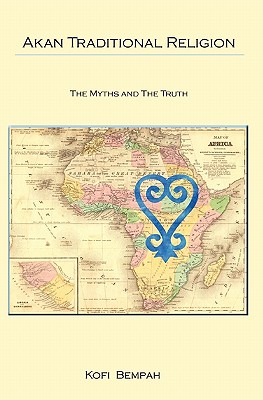Akan Traditional Religion: The Truth and the Myths

Akan Traditional Religion: The Truth and the Myths
Among most products of alien education, there is total lack of moral virtues, honesty, integrity, eagerness to serve and readiness to sacrifice. Rather, he is enslaved by the glittering fancies and fascinations of other cultures. He has embraced, and is enthused by, a religion which compels him to acknowledge that he is a sinner who has to work hard to attain purity which he already is. If the new religions made him more caring, honest, sincere, God-fearing and less sin-loving' there would be no need for this work. He has assumed political and judicial roles and is ruling a society, the majority of whose members live with, and cherishes, the traditional knowledge he holds in contempt and disdain. His rule can be successful, fruitful and beneficial to himself and others if he re-educates and equips himself with the philosophy underpinning his religious/spiritual heritage, instead of using political power to impose his new-found religion and its values on his people. In Akan Traditional Religion, the author has revisited the native religion of the sophisticated Akans who built the vast Asante Empire even before the British dreamt of an empire. He has re-examined, analysed and reinterpreted this heritage from the Akan point of view rather than as part of the colonial legacy in Africa. He concludes that the Akan traditional religion is no less holy than, or the ethical values it espouses inferior to, any other religion. Akan traditional religion proclaims that the one God is, and in, everything, that is to say, a living universe based on Universal Consciousness. (This is why Akans readily accept any name, such as Allah, Jesus, Krishna, the Father, etc. used by other communities to denote the One God). In other words, it espouses the doctrine of unity in diversity. The individual forms (bodies) are activated and operated by the same one God. The differences between individuals only reflect the diversity. The self-aware individual shares in divine power and majesty; the totally ignorant person thinks he is the body and caters only to the needs and comforts of the body. Identification with the body makes him prone to suffering from excessive desires which expose him to fear, anxiety, lust, anger, pride, etc. as a consequence. The heaven/hell dichotomy is absent in Akan doctrine. All will become divine, eventually. This principle of unity in diversity, rather than conflict and strife, guides the Akan in his personal life, (wo yonko da ne woda; i.e. the bed you
PRP: 232.11 Lei
Acesta este Pretul Recomandat de Producator. Pretul de vanzare al produsului este afisat mai jos.
208.90Lei
208.90Lei
232.11 LeiLivrare in 2-4 saptamani
Descrierea produsului
Among most products of alien education, there is total lack of moral virtues, honesty, integrity, eagerness to serve and readiness to sacrifice. Rather, he is enslaved by the glittering fancies and fascinations of other cultures. He has embraced, and is enthused by, a religion which compels him to acknowledge that he is a sinner who has to work hard to attain purity which he already is. If the new religions made him more caring, honest, sincere, God-fearing and less sin-loving' there would be no need for this work. He has assumed political and judicial roles and is ruling a society, the majority of whose members live with, and cherishes, the traditional knowledge he holds in contempt and disdain. His rule can be successful, fruitful and beneficial to himself and others if he re-educates and equips himself with the philosophy underpinning his religious/spiritual heritage, instead of using political power to impose his new-found religion and its values on his people. In Akan Traditional Religion, the author has revisited the native religion of the sophisticated Akans who built the vast Asante Empire even before the British dreamt of an empire. He has re-examined, analysed and reinterpreted this heritage from the Akan point of view rather than as part of the colonial legacy in Africa. He concludes that the Akan traditional religion is no less holy than, or the ethical values it espouses inferior to, any other religion. Akan traditional religion proclaims that the one God is, and in, everything, that is to say, a living universe based on Universal Consciousness. (This is why Akans readily accept any name, such as Allah, Jesus, Krishna, the Father, etc. used by other communities to denote the One God). In other words, it espouses the doctrine of unity in diversity. The individual forms (bodies) are activated and operated by the same one God. The differences between individuals only reflect the diversity. The self-aware individual shares in divine power and majesty; the totally ignorant person thinks he is the body and caters only to the needs and comforts of the body. Identification with the body makes him prone to suffering from excessive desires which expose him to fear, anxiety, lust, anger, pride, etc. as a consequence. The heaven/hell dichotomy is absent in Akan doctrine. All will become divine, eventually. This principle of unity in diversity, rather than conflict and strife, guides the Akan in his personal life, (wo yonko da ne woda; i.e. the bed you
Detaliile produsului









